Preliminary Work
In the Summer of 2021, the ReConnect/ReCollect team put together a set of goals and a budget. With a project development grant from the Humanities Collaboratory, we conducted a preliminary survey of U-M’s Philippine Collections and began to articulate a vision for what ReConnect/ReCollect could eventually become.
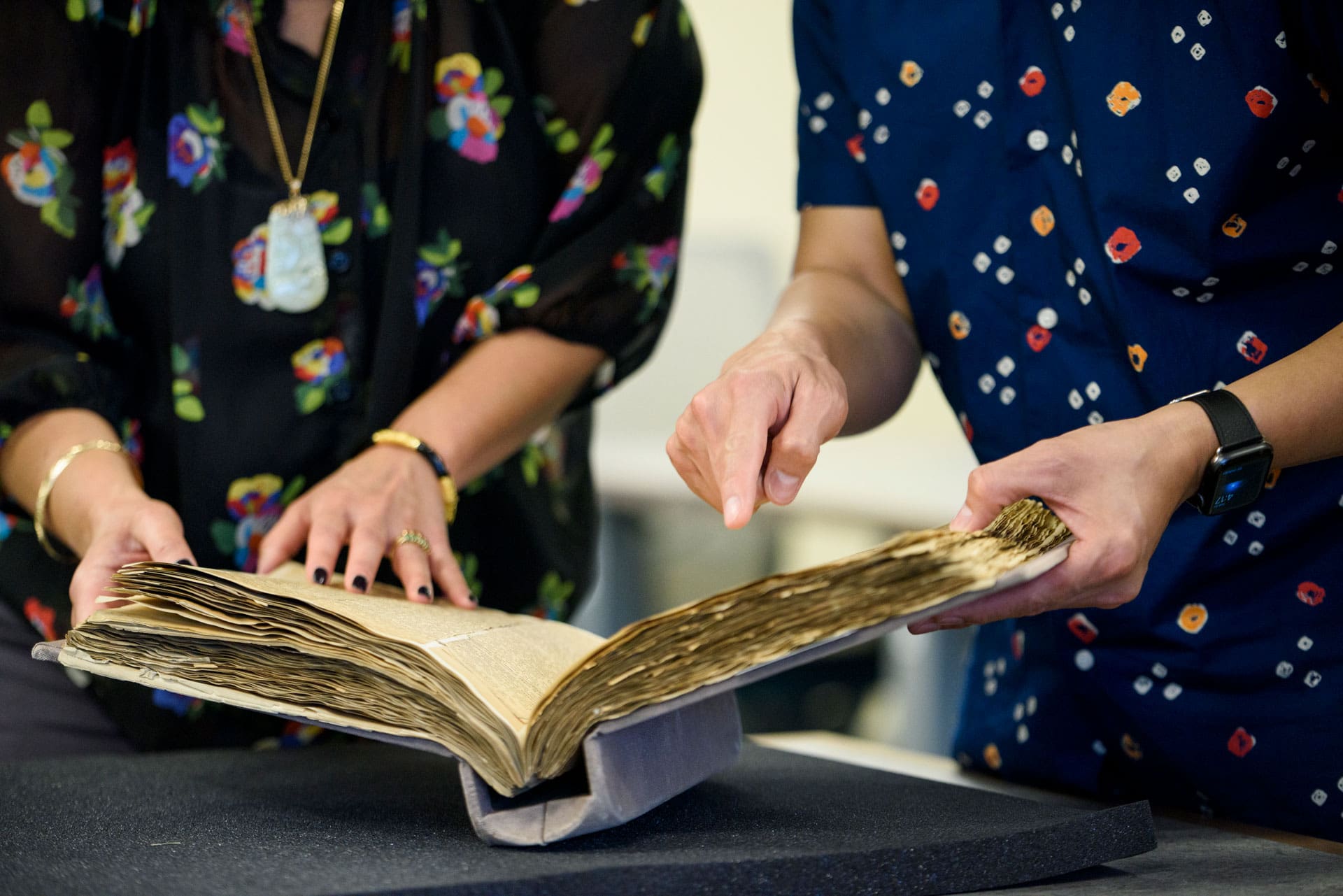
ReConnect/ReCollect Receives Grant from the Humanities Collaboratory
ReConnect/ReCollect received two years of funding from the University of Michigan’s Humanities Collaboratory, which provides resources for humanities scholars to experiment with collaborative, team-based approaches to humanities research.
Reparative Collections Survey Begins
We began a full inventory of Philippine collections on campus, including discovery of unprocessed materials, diagnosis of harm at all levels (e.g., acquisition, representation, contextualization, stewardship, and utilization), and development of recommendations for repair (e.g., through the revision of item-level description, finding aids, access systems, etc.).
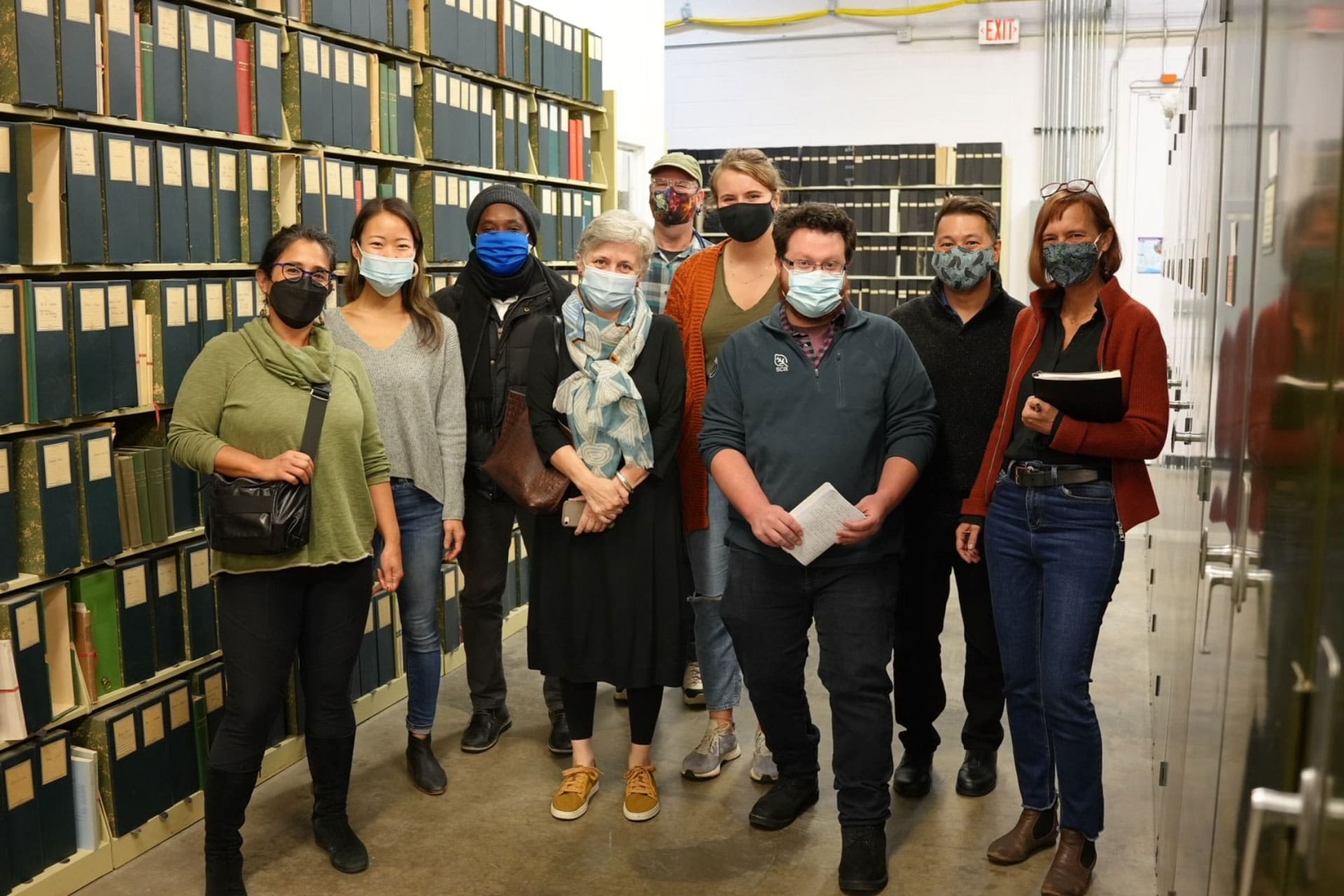
Visiting the Collections
The ReConnect/ReCollect Team visited Philippine Collections housed at different institutions spread across campus, including the Research Museums Center, the Bentley Historical Library, and U-M’s Special Collections Research Center.
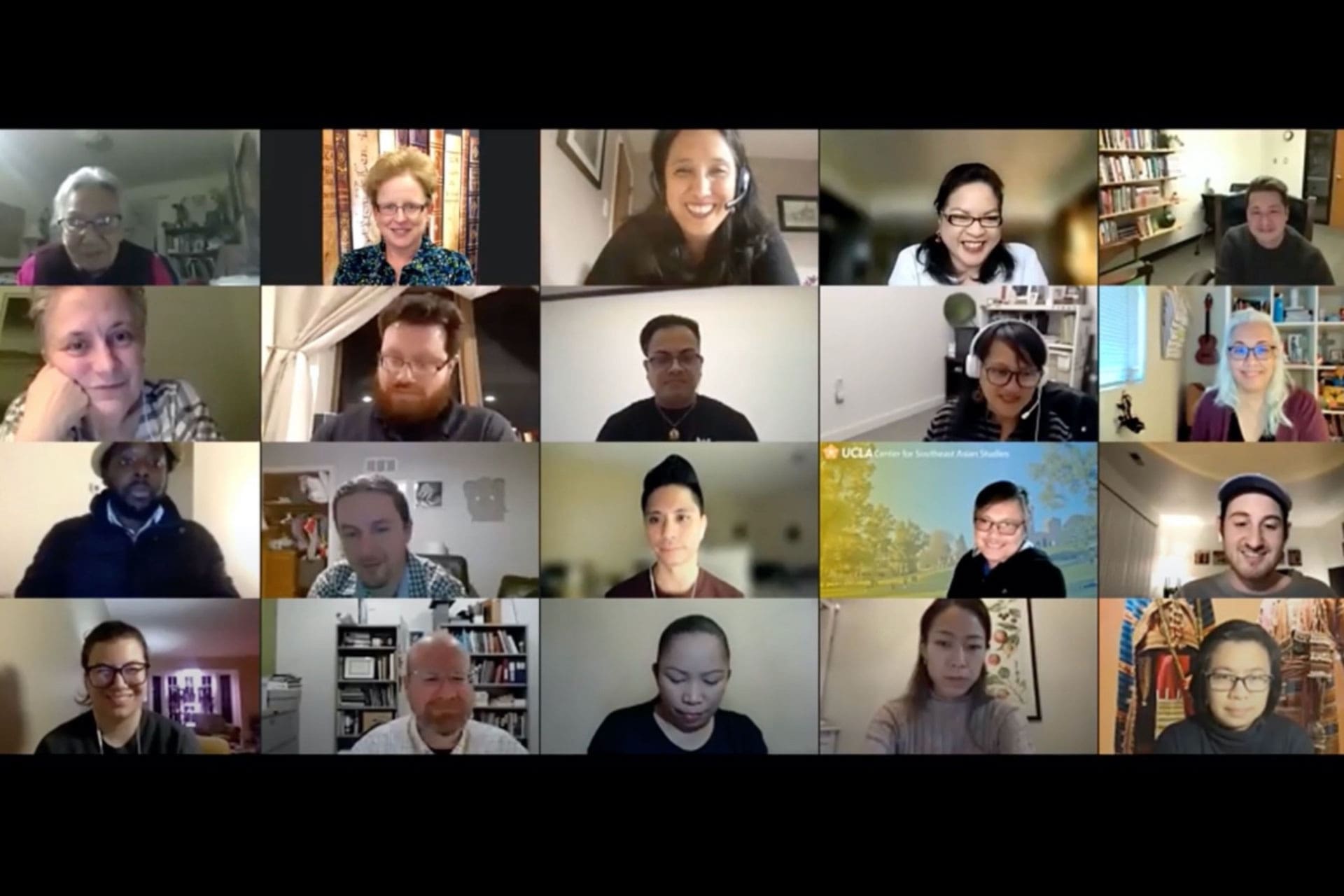
Convening the External Advisory Board
In our first meeting, the ReConnect/ReCollect team summarized the project’s process so far, introduced the board to the Philippine Collections, discussed the collections survey, and defined priorities for the future of the project.
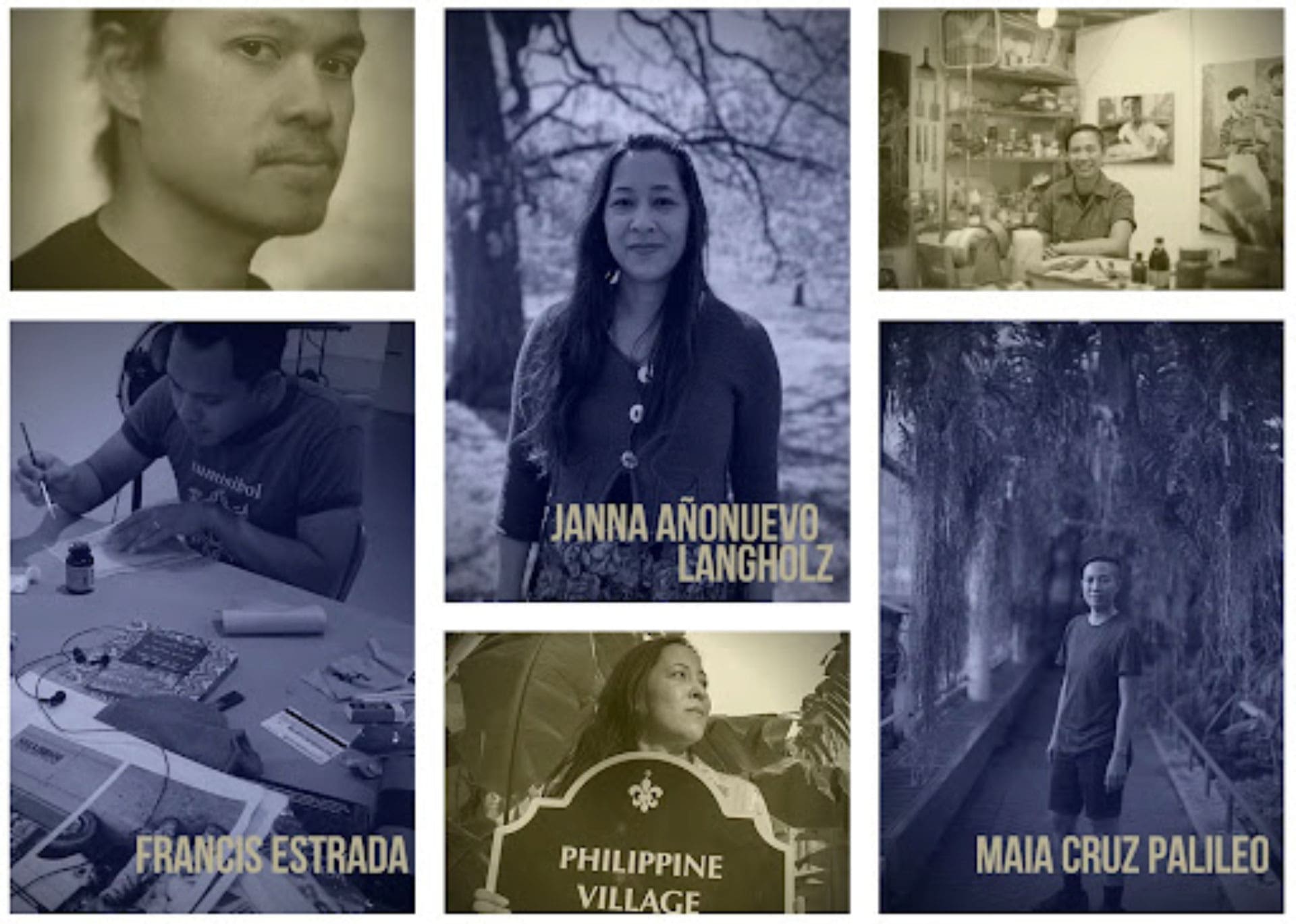
Artists Finalized for Residency I
From a highly talented pool of artists invited to apply, the ReConnect/ReCollect team team selected Maia Cruz Palileo, Janna Añonuevo Langholz, and Francis Estrada to come to U-M’s campus for a two-week residency exploring the themes of archives, material history, decolonial praxis and restitution, and Filipino, Filipino American, and/or Indigenous identity. The residency was an opportunity to engage in conversations around creative expression as inspired or provoked by the content of our collections in the encounter with them. Our invitation to artists was to ponder the history of imperialism, collecting, and archives alongside us, and to be part of a process that fosters openness and exploration.
Glossary of Harmful Terminology Project Begins
This initiative aims to identify and address harmful terminologies within Philippine collections originating from U-M’s involvement in the American colonization of the Philippines. This project has resulted in the creation of a glossary that both highlights and provides context for problematic terms found in collection finding aids across the U-M campus. The Glossary of Harmful Terminology is a valuable resource primarily designed for archivists, researchers, and educators working with similar collections, aiming to promote cultural sensitivity in archival description, foster collaboration with local communities, and shed light on how language shapes historical understanding and cultural interpretation, particularly in the context of colonial legacies.
GIS Project Completed
Working with the University of Michigan Museum of Anthropological Archaeology, a Geographic Information System (GIS) digital map was created in an effort to pinpoint locations where the human remains curated by the University were removed from, based on descriptions found in original field notes. This map opened up a larger research project regarding ethical stewardship of the human remains housed at the University of Michigan.
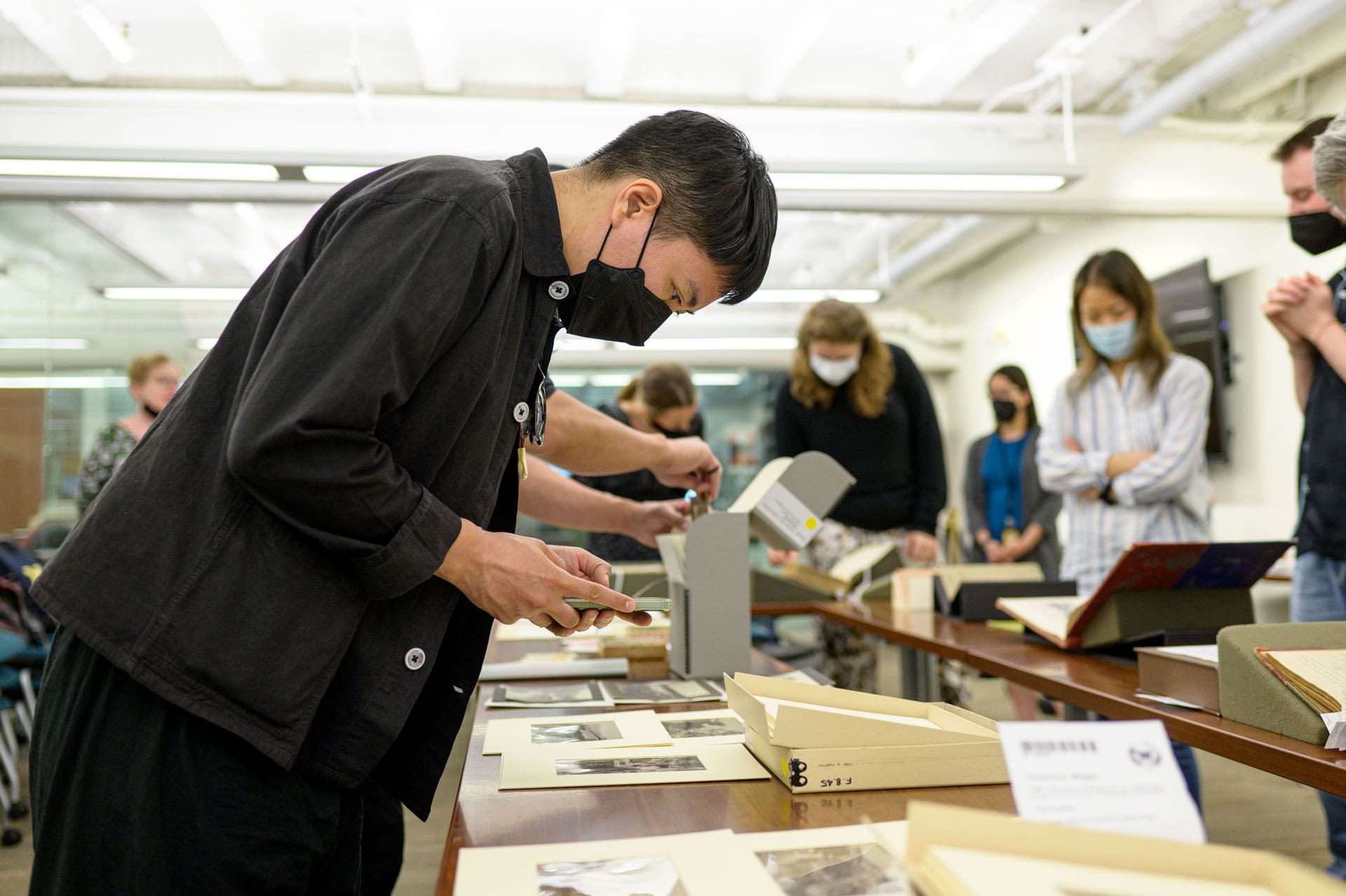
Artist Residency I
From May 14 – May 29, 2022, three US-based visual artists of Filipino descent, Maia Cruz Palileo, Janna Añonuevo Langholz, and Francis Estrada, explored and engaged U-M’s Philippine collections. A public round table event capped off their residency. The residency’s goal was to explore the themes of archives, material history, decolonial praxis and restitution, and Filipino, Filipinx, and/or Indigenous identity; there were no expectations for producing work, although in March 2023 Maia Cruz Palileo held a solo exhibition of their work largely inspired by the ReConnect residency.
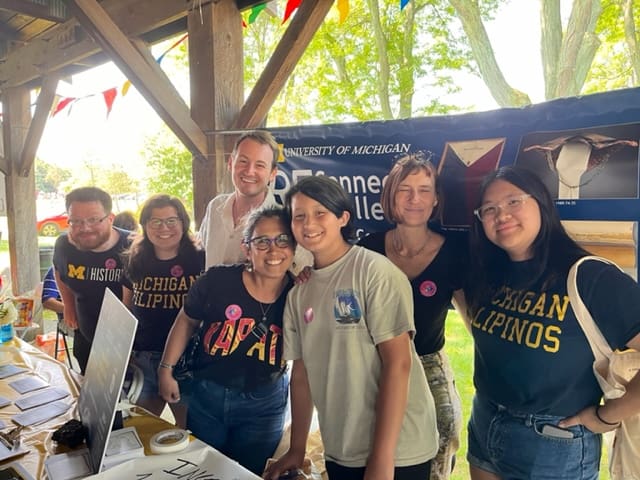
Kalayaan
As a Platinum Sponsor of the FILAMCCO (Filipino American Community Council of Michigan) Kalayaan 2022 celebration of Philippine Independence Day, ReConnect/ReCollect hosted a table at the association’s largest outdoor event of the year. As part of the Reparative Connections initiative of the R/R project, at Kalayaan ReConnect/ReCollect used interactive games and conversations to raise awareness about and promote community engagement with the Philippine Collections at the University of Michigan.
Retreat I
At the one year mark of our project, ReConnect/ReCollect hosted a team retreat where we reviewed our commitments, how we were meeting our goals, and how we wanted to go forward with the project. Finding a mode of addressing the Philippine human remains in U-M’s collections, creating opportunities for communities to interact with collections, and working on the glossary of harmful terminology were set as priorities for the coming year.
Philippine Collections at UMMAA Website Launched
In an attempt to address the question: “What do you have in your collections?” undergraduate student Alyssa Caldito created a website and wrote several object blog posts to provide an idea of the content and breadth of UMMAA’s Philippine collections.
Filipino American National Historical Society (FANHS) Conference Presentation in Seattle
Members of the ReConnect/ReCollect team spoke at a FANHS conference roundtable, sharing their experiences with reparative curation, community connections, and scholarship. Co-directors Deirdre de la Cruz and Ricky Punzalan provided project context. Robert Diaz discussed surveying the U-M’s Philippine collections and related issues, and Madeline Bacolor described her community engagement work. Community elder and EAB member Adelwisa (Deling) Agas Weller highlighted the historical contributions of U-M’s faculty and students to study the Philippines and mobilize around the colonial history of the collections.
Second Meeting with External Advisory Board
The second ReConnect/ReCollect External Advisory Board meeting covered the project’s progress at the conclusion of the first year as well as future goals for year 2. In the first year, the project achieved significant milestones, including the completion of a survey of Philippine collections on campus, the development of a lexicon to identify harm in archival collections, and engagement with artists and the community. In the second year, the project planned to focus on reparative description, hosting open houses, developing a toolkit, and presenting at conferences. The meeting also featured a discussion on the sensitive topic of human remains in the collection, addressing issues related to their origin, curation, and potential repatriation, with an emphasis on legal and ethical protocols, appropriate curation, public engagement, and institutional readiness.
Human Remains Research Planning Begins
Coming out of the External Advisory Board meeting, the ReConnect/ReCollect team began planning more extensive research about the human remains in U-M’s Philippine Collections.
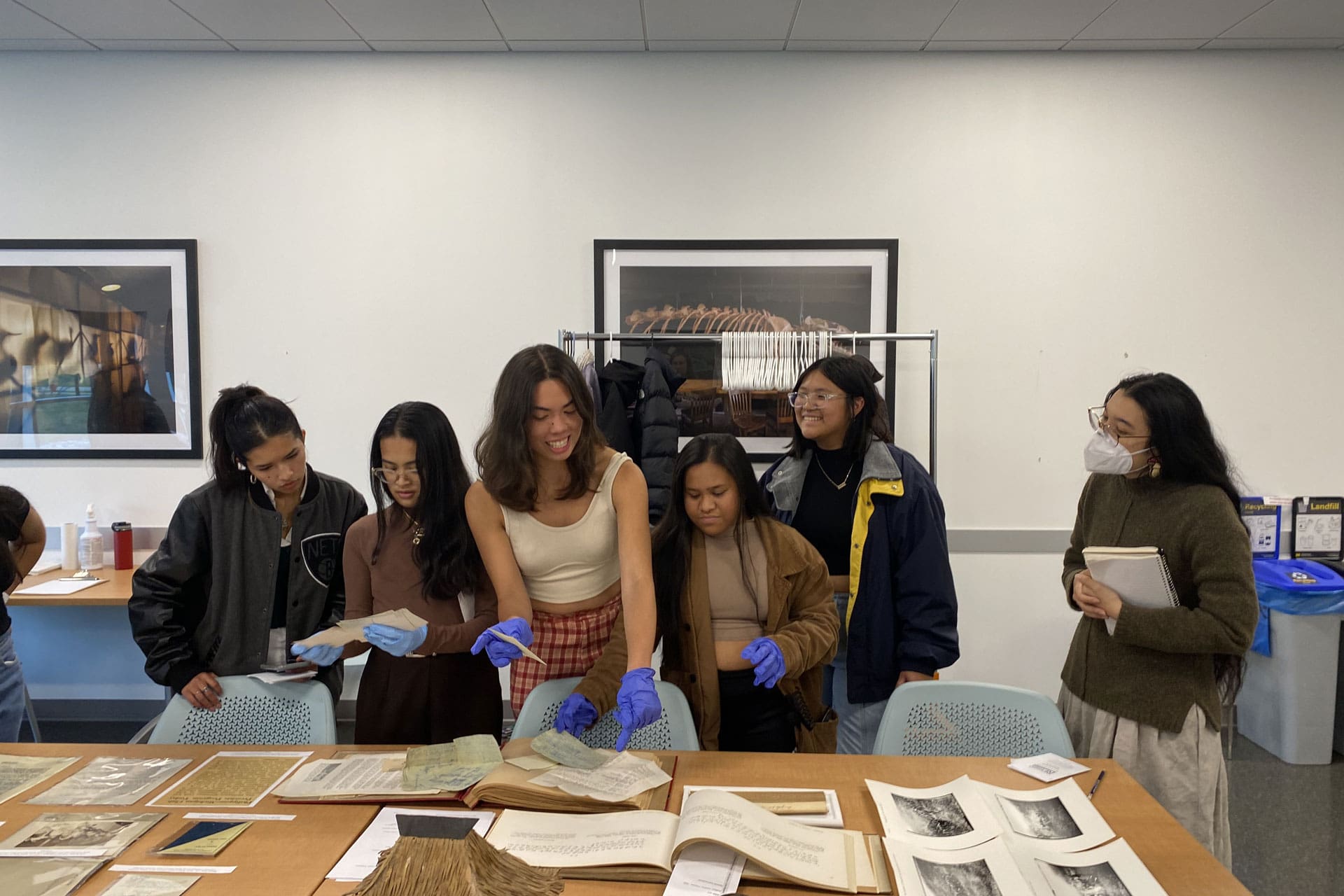
Filipino American Student Association (FASA) in the Collections
ReConnect/ReCollect invited the Filipino American Student Association (FASA) at the University of Michigan to an open house and tour of the U-M Museum of Anthropological Archaeology. Students engaged materials from the Philippine Collections, including a collection of FASA’s records and histories of Filipino students at U-M from the Bentley Historical Library and items from the archeological collections. Students had the opportunity to add to the Bentley’s collections by documenting their own experience at the U-M.
Philippines Museum Congress
Ricky Punzalan, Jim Moss, and Deirdre de la Cruz each gave virtual presentations about the U-M’s Philippine Collections and ReConnect/ReCollect at the Philippines Museum Congress, “Plotting Points: Resource, Access, Network,” which was held from October 17-19, 2022 at the Ayala Museum in Makati City, the Philippines. Building relationships with museums practitioners in the Philippines is one important commitment of ReConnect/ReCollect.
Association of Tribal Archives, Libraries, and Museums Conference(ATALM)
Members of the ReConnect/ReCollect team presented at the Association of Tribal Archives, Libraries, and Museums Conference (ATALM), focusing on the community engagement centered elements of the project and aiming to raise public awareness about the collections.
Residency 2.0 Announced
ReConnect/ReCollect began planning for a second series of artist residencies, which would collaborate with partners from our expanding networks to bring artists and culture bearers from the Philippines. Both residencies in year two would feature public-facing workshops and demonstrations that included items from the UM Museum of Anthropological Archaeology (UMMAA).
Focus Groups Convened for Human Remains Research
The ReConnect/ReCollect team began leading focus groups for our research centered on the human remains in the Philippine Collections at the University of Michigan. We aimed to include diverse perspectives from Filipino, Indigenous, and Filipino diasporic communities, as well as from those who could speak to institutional capacities and protocols. Conducting sessions with the R/R External Advisory Board, museum and repatriation experts, academic and institutional experts in the Philippines, local communities, and Indigenous representatives, we aimed to understand the meaning of this collection for various constituencies, most especially those of Filipino and Indigenous descent. We then wanted to know how existing legal, ethical, and curatorial protocols might apply to Philippine human remains at UMMAA. Finally, we wanted to consider the steps UMMAA and the University might feasibly take to further develop culturally-appropriate and historically-minded ethical and respectful approaches to the stewardship, representation, and access to Philippine human remains.
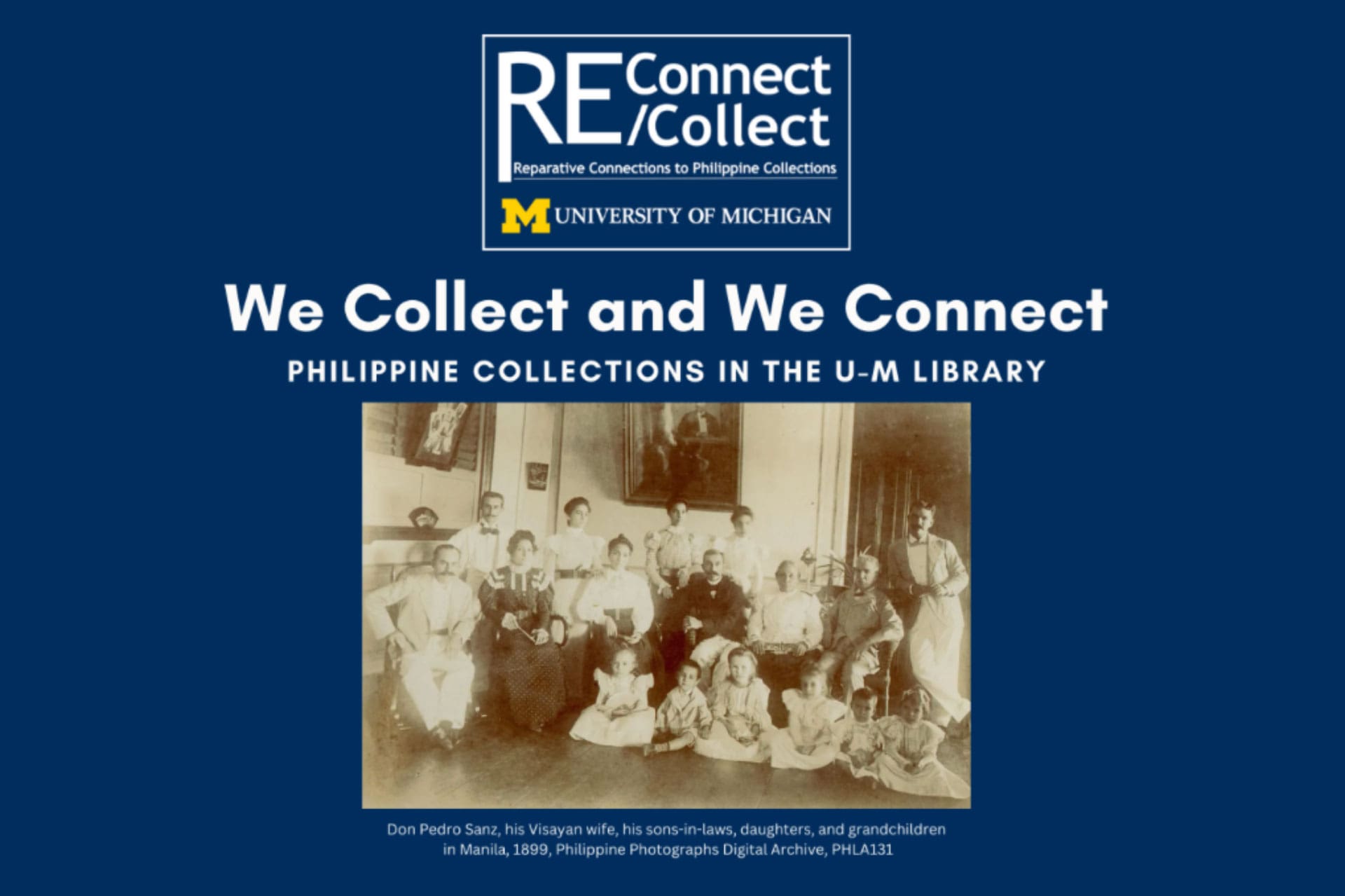
We Connect/We Collect at Special Collections
In collaboration with ReConnect/ReCollect, the Special Collections Research Center hosted an after-hours event at the University of Michigan Library. This event offered an opportunity for the public to peruse Special Collections’ extensive collection of letters, diaries, photographs, maps, books, and other material documenting early 20th-century Philippine history and to learn more about ReConnect/ReCollect: Reparative Connections to Philippine Collections at the University of Michigan.
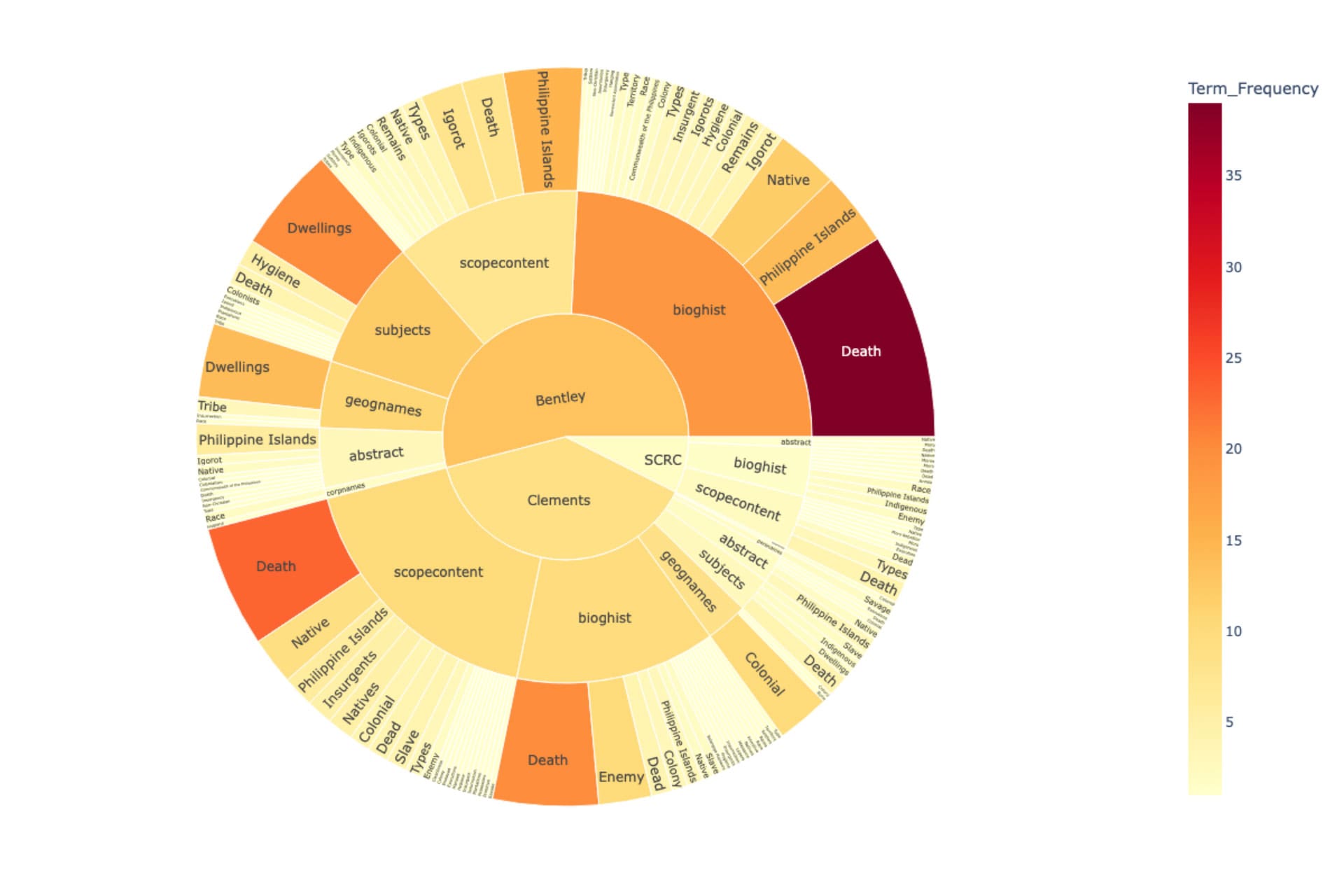
Automation Script Project “Encoding Reparative Description” Begins
The ReConnect/ReCollect team began work on the Encoding Reparative Description Automation Tool, a computational tool designed to advance the practice of reparative description in the context of archival and library data. The tool empowers users to pinpoint and analyze problematic terminology and patterns within descriptive resources, ultimately facilitating the pursuit of more inclusive and accurate descriptions. Its primary purpose is diagnostic and analytical, enabling users to identify and analyze problematic terminologies and patterns within descriptive resources for more inclusive and accurate descriptions. This tool accommodates a set of 247 finding aids, encoded in XML format according to Encoded Archival Description (EAD), and offers a modifiable term list for customized analysis. Leveraging Python and relevant libraries, it extracts text elements, identifies problematic terms, and generates visualizations for comprehensive analysis.
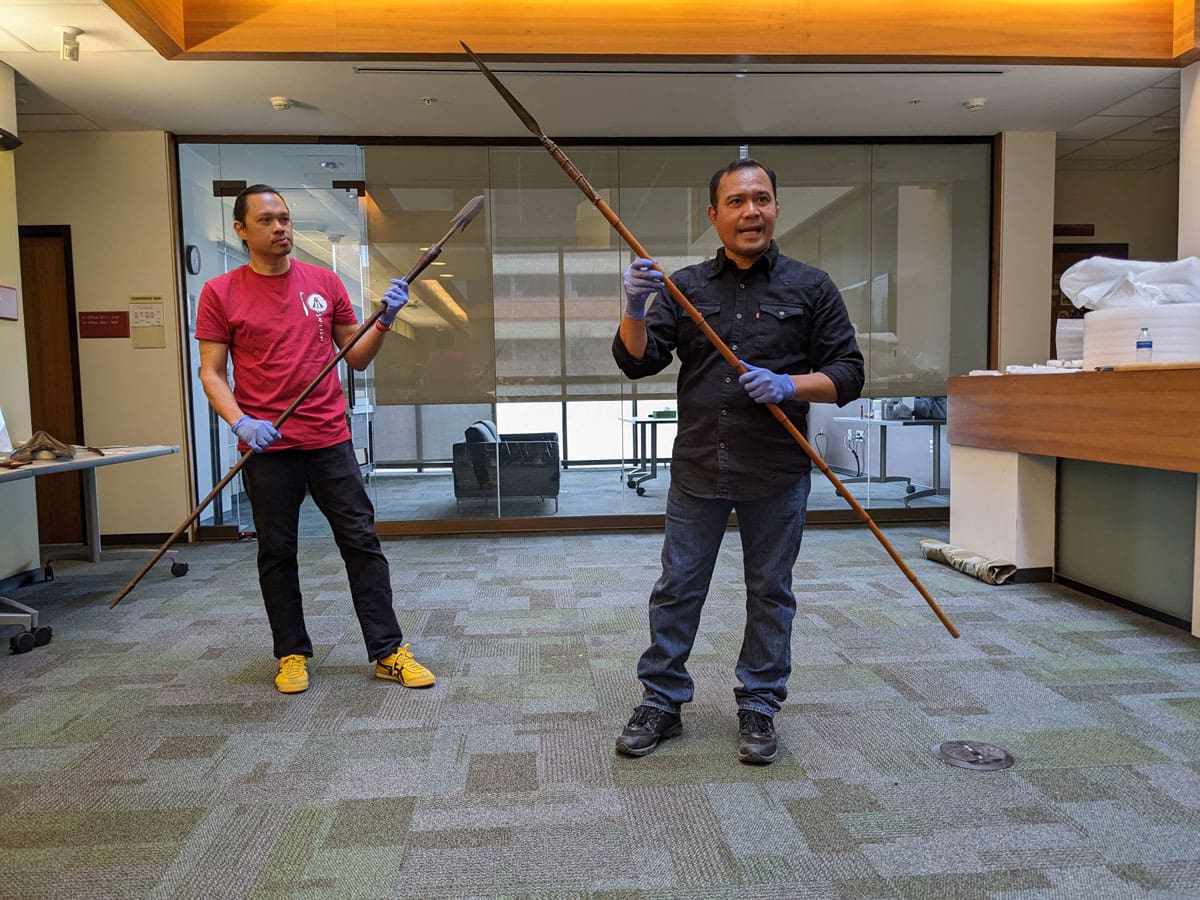
Artist Residency with Tuhon Rommel Tortal and Francis Estrada
The second artist residency at U-M invited Filipino Martial Artists Tuhon Rommel Tortal and Francis Estrada, two highly respected instructors in Pekiti Tirsia Kali (PTK), a traditional Filipino martial art indigenous to the Visayan Region of the Philippines, to campus for one week of engagement with UMMAA’s significant collection of Philippine bladed weapons. The culture bearers had the opportunity to “reactivate” the collections, recontextualizing the histories of artifacts related to their practice and explaining their use. A final public event included a lecture, demo/workshop, and the opportunity to interact with select weapons from the University of Michigan’s Museum of Anthropological Archaeology.
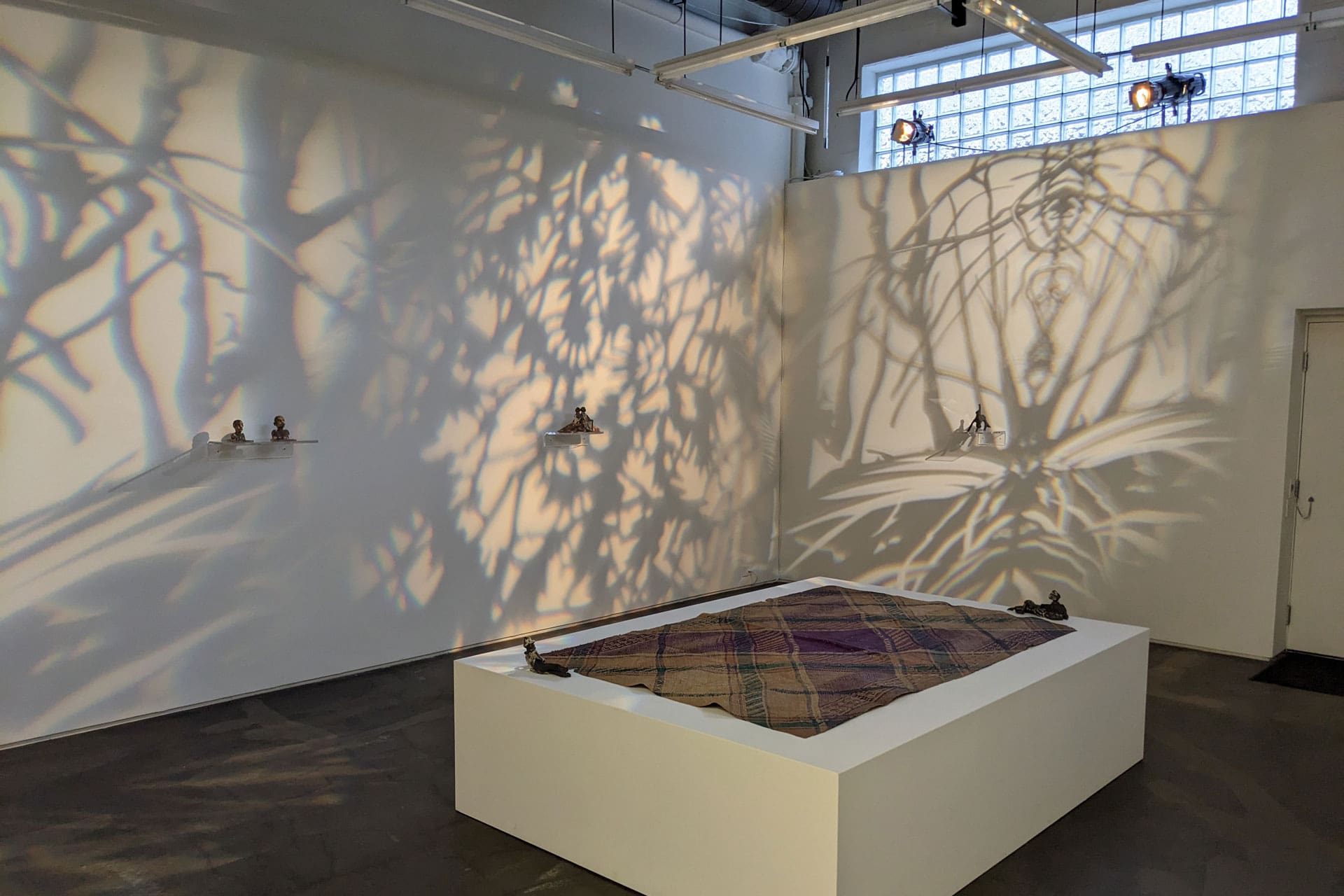
Maia Cruz Palileo’s Exhibit in Chicago
At the request of Maia Cruz Palileo, the U-M’s Museum of Anthropological Archaeology loaned a banig (woven mat) to the Monique Meloche gallery for the exhibition “Days Later, Down the River,” which ran from April 1 to May 26, 2023. Maia’s show was partially inspired by their engagement with the University of Michigan’s collections the previous year during the 2022 Artist Residency.
Members of the ReConnect team, along with the artists from the 2023 Residency, visited the exhibition during their May trip to Chicago.
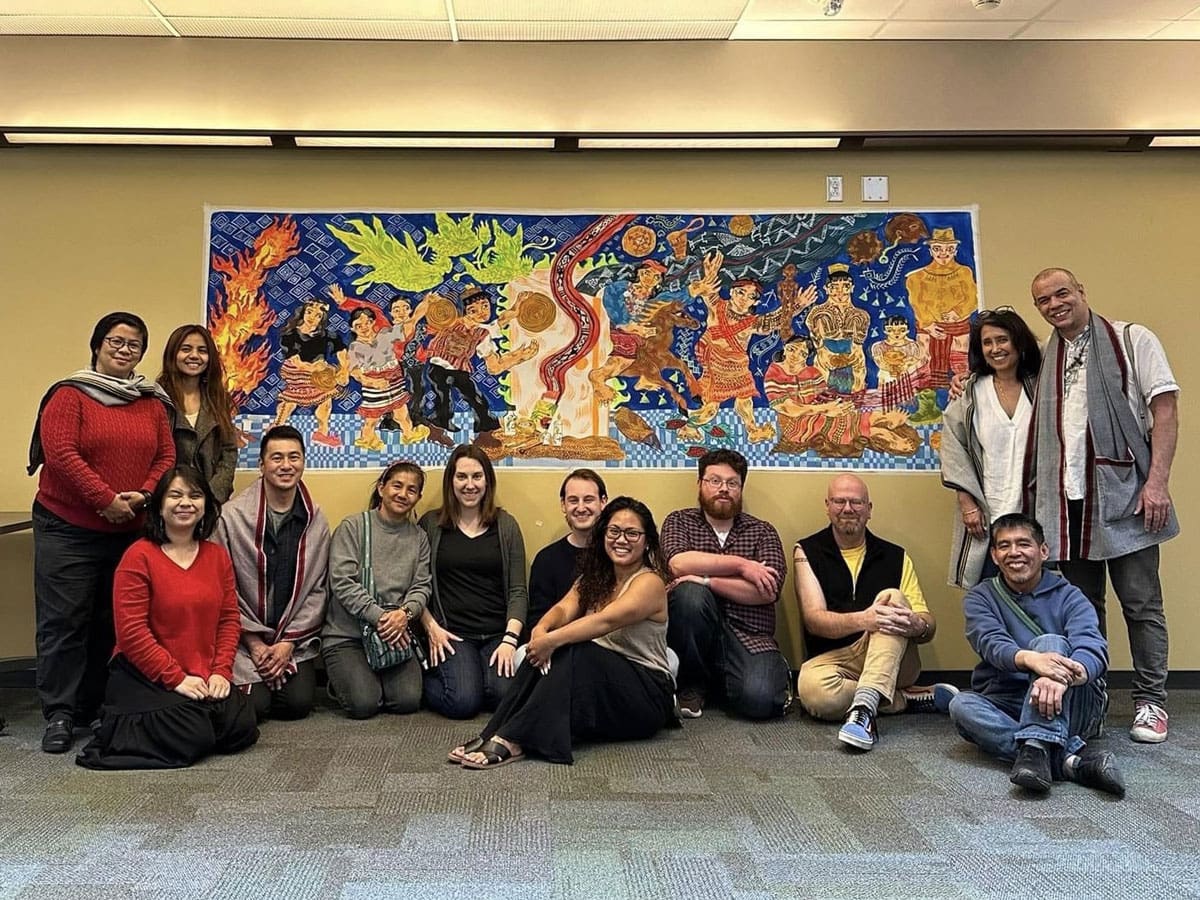
Culture Bearer Residency
For the third and final artist residency, ReConnect/ReCollect collaborated with University of the Philippines Baguio Professor of Anthropology Dr. Analyn Salvador-Amores to bring Indigenous People (IP) culture bearers Cathy Ekid-Domigyay (Bontoc – back strap loom weaver), Johnny Bangao, Jr. (Kankana-ey – basket weaver), and Ammin Acha-ur (Kalinga – tattoo artist) to the collections. They spent the first of two weeks in the Philippine collections at the UM Museum of Anthropological Archaeology. The second week was spent at the Bentley Historical LIbrary, the Special Collections Research Center, and the Newberry Library and the Field Museum in Chicago. A hands-on, public workshop at the U-M gave the community a chance to learn from these master artists.
Retreat II
As the two-year ReConnect/ReCollect project approached its culmination, the project team gathered at the Special Collections Research Center for a thorough and reflective meeting. This gathering was dedicated to reviewing the extensive progress made over the project’s two-year duration. Various team members and subcommittees took the opportunity to showcase their respective projects and contributions. The meeting also fostered a broader discussion on the valuable insights gained through interdisciplinary collaboration during this ambitious endeavor. The event culminated in a thoughtful conversation centered around the design and implementation of a web toolkit, which would serve as a platform to effectively convey the lessons and experiences garnered by ReConnect/ReCollect in their exploration of reparative and community-focused work.
UMMAA Collection Guides Made Available
Working with a team of undergraduate and graduate students, the Reparative Description team met weekly and bi-weekly during the 2022-23 academic year to discuss how to integrate the concept of reparative description into collection guides for the Special Collections Library and Museum of Anthropological Archaeology. Undergraduate students Sara Reed and Sophie Wolf researched and wrote Collection Guides for UMMAA’s 18 largest Philippine collections, which were made available on the Philippine Collections at UMMAA website.
Reparative Curation Presentation at the Bentley Historical Library
The Reparative Description team made their final presentation of their year-long effort to ReConnect/ReCollect and representatives from collections across the University. Highlights included an explanation of the Glossary of Harmful Terminology and an update on the automation process for term identification within finding aids. Presentations by team members emphasized the complexities, challenges, and progress made in making collections more accessible and accurate while reckoning with colonial history.
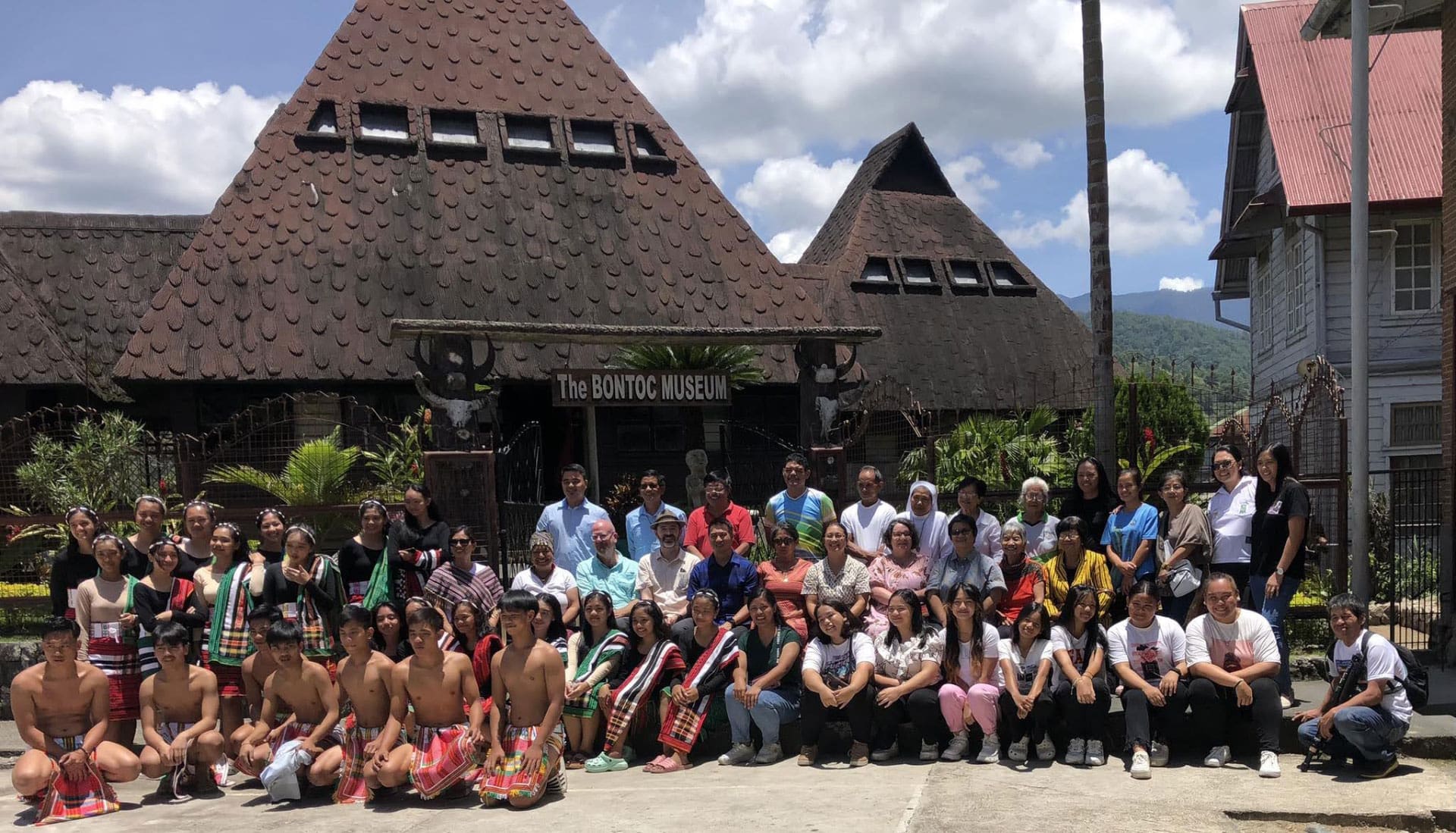
Philippines Trip
In August 2023, a group of representatives from the ReConnect/ReCollect team traveled to the Philippines to handover digital and print copies of several of U-M’s archival and photographic collections to Filipino and Indigenous institutions and communities. Focusing on the Cordillera region of Northern Luzon, representatives from ReConnect/ReCollect continued the work of building lasting relationships with Filipino and Indigenous scholars, cultural workers, and community organizers to encourage greater accessibility to U-M’s collections. Digital copies of these collections can now be found at numerous museum and educational institutions across Luzon. Plans are in the works to further expand Philippine access to U-M’s collections in years to come.
Toolkit Development
With a dissemination grant provided by the Humanities Collaboratory, ReConnect/ReCollect collaborated to build our most important tangible product–this publicly available ‘toolkit,’ or suite of adaptable and practical resources for reparative approaches to colonial collections.
